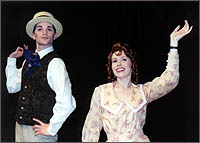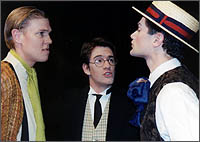| 
Candide
April 8, 2003 :: No. 192
 |
Candide members, Matt
Lara (Maxmillian)
and Sarah Lartigue (Cunegonda)
 Download image
Download image
|
Featuring a legendary score by Leonard Bernstein (of
“West Side Story” and “On The Town” fame),
this rarely offered version of CANDIDE, was written
in two acts for the Scottish Opera in Glasgow. Unlike other versions,
the opera house edition remains exceptionally true to Voltaire's
original book with its French blend of wicked humor and biting satire.
Director Dean Hess has sought to make Voltaire’s
story even more meaningful to modern audiences by changing its original
18th century setting to the 20th century. “Voltaire’s
piece has distinct parallels with today,” Hess explains. “I’ve
evolved the times and locations but found modern counterparts: Voltaire’s
wealthy community of Westphalia becomes the Ruhr Valley (home of
the Industrial Revolution), the Spanish Inquisition becomes the
purging of 35,000 Masons in Portugal, and the slave trade in Buenos
Aires has its parallel in Surinam. Audiences will see Voltaire’s
story is timeless.”
Hess continues, “I am especially excited about
our production as it offers the best of the best to our audiences—a
tremendously creative blend of the College of the Arts’ top
performers and singers from both the Department of Theatre and Dance
and the Department of Music.”
Bringing another dimension of life to Voltaire’s
book is the music of CANDIDE. “Composer Leonard Bernstein's
music has always been about one thing: exploring the differences
among people and pleading for tolerance to allow us to live in peace
and kindness,” explains John Mauceri, who worked with Bernstein.
“From the entrance into Venice to the end of the play the
musical numbers flow with almost no dialogue through the glorious
finale.”
 |
Left to right: Benjamin Plaché
(Candide), Jonathan D. Schoenherz (Pangloss), and Matt Lara
(Maxmillian)
 Download image
Download image
|
Orchestra director Kimo Furumoto shares his thoughts
on conducting the 50-plus-member cast in the score stating, “If
West Side Story is considered one of Bernstein's most moving works
then CANDIDE surely must be considered his wittiest work. It is
chock full of catchy tunes that bring the original novel by Voltaire
to life with satirical humor. Bernstein employs the gamut of his
compositional style from grand opera to American popular music in
this brilliant score. In doing so he has placed extreme demands
on the singer/actors who play the various roles in the work. As
we follow the hapless youth Candide in his quest for ‘the
best of all possible worlds,’ we ultimately realize that we
must each find out what our unique contribution to humanity is,
to ‘make our garden grow.’”
The cast includes: Christopher Manus (April 25, 27
May 1, 3) and Jonathan D. Schoenherz (April 26 May 2,4) as Voltaire/Pangloss/
Cacambo/Martin; Benjamin Plaché (April 25, 27 May 1,3) and
Brad Standley (April 26 May 2, 4) as Candide; Matt Lara (April 25,
27 May 1, 3) and Daniel Canaday (April 26 May 2, 4) as Maximilian;
Kellee Schildknecht (April 25, 27 May 1, 3) and Sarah Lartigue (April
26 May 2, 4) as Cunegonde; Andrea Dodson (April 25, 27 May 1, 3)
and Jessica Mason (April 26, May 2, 4) as Paquette; Lilly Mettler
(April 25, 27 May 1, 3) and Renée Tatum (April 26 May 2,
4) as Old Lady; Richard E. Hall as Governor/Vanderdendur; and Samuel
Nuñez as Captain.
More are: Bryan Balderman as Sultan Achmed; Jon-Enée
Merriex as Hermann Augustus; Dashaun Young as Charles Edward; Scott
Ziemann as Stanislaus; Jason Halliday as Tsar Ivan; Mike Adkins
as Ragotsi; Devon Glenn as Crook; Kim Walthall as Cosmetic Merchant;
Mike Adkins as Doctor; Dashaun Young as Bear-keeper; Matt Frazier
as Alchemist; Jon-Enée Merriex as Junkman; and Jonathan Infante
as Grand Inquisitor. In addition, the production also features a
large ensemble of singers and dancers.
Designers include: Ann Sheffield, sets; Bruce Goodrich,
costumes; Deb Lockwood, lighting; Joy Shannon, make-up; and Nathan
Jones, sound.
This production is suggested for mature audiences,
as theatergoers of today may find it unashamedly "politically
incorrect" with race, ethnicity sexuality, politics and religion
ridiculed to the extreme. As is the point of satire, it is these
extremes that Voltaire questions and seeks to correct in his original.
| Media Contacts: |
Elizabeth Champion, College of the Arts at 657-278-2434
Dr. Jim Volz, Professor, Department of Theatre and Dance at
657-278-3538 |
«
back to Theatre & Dance
|